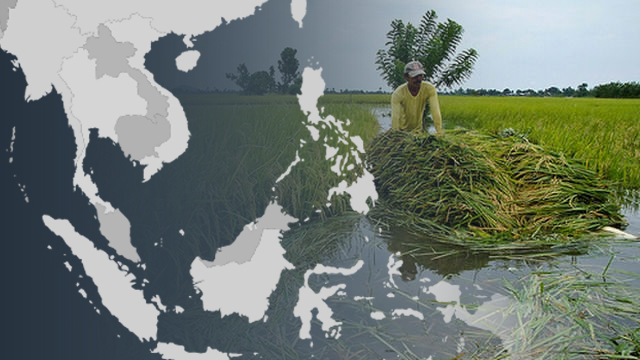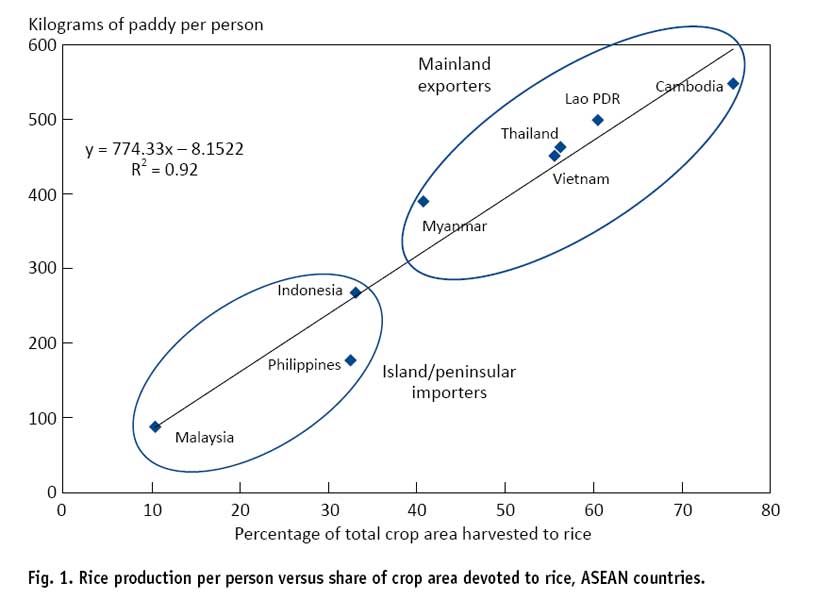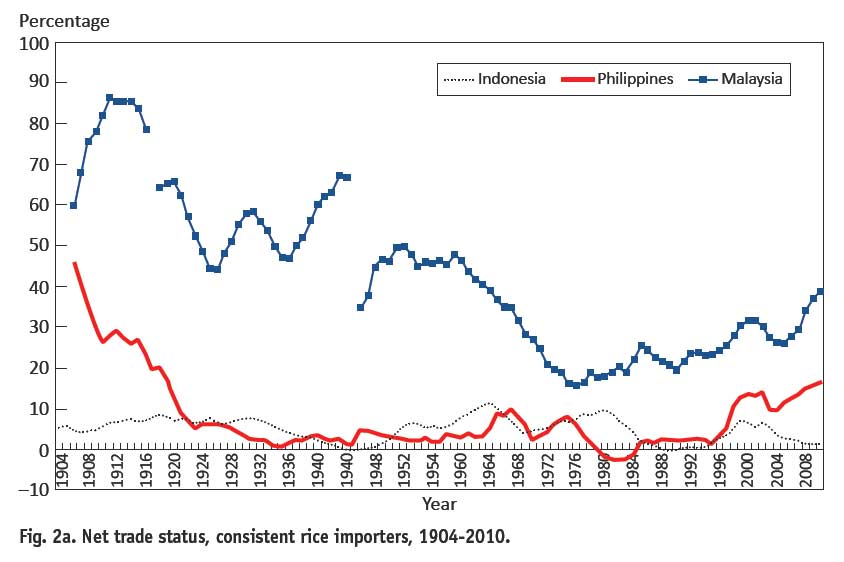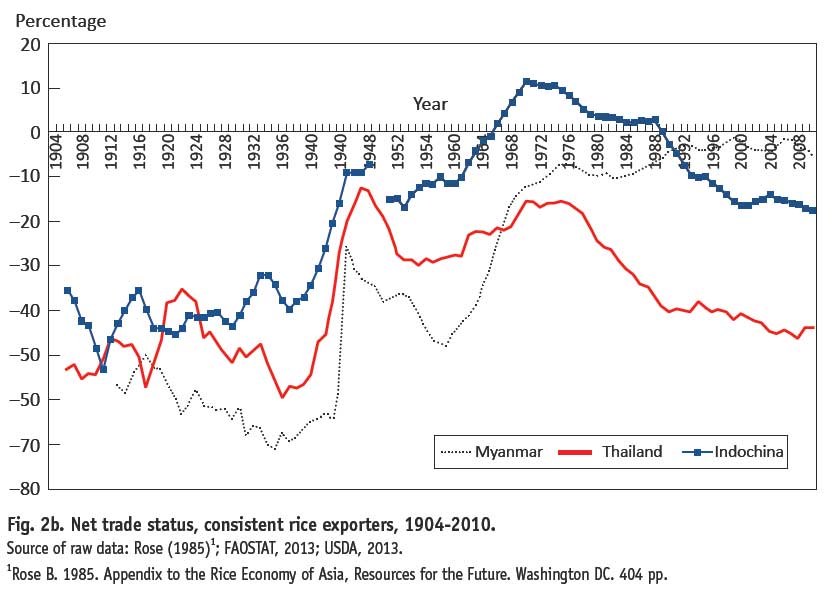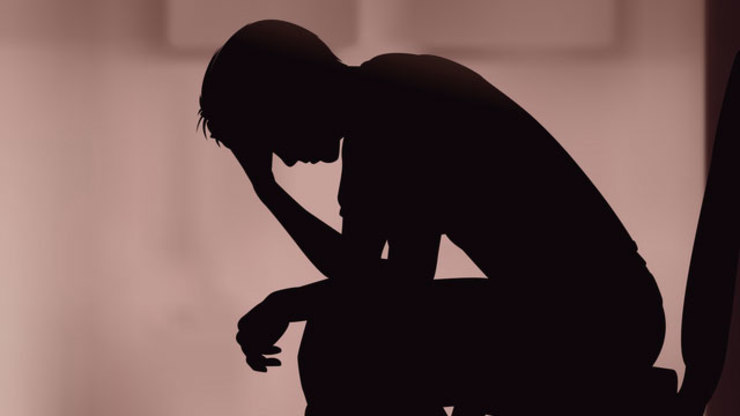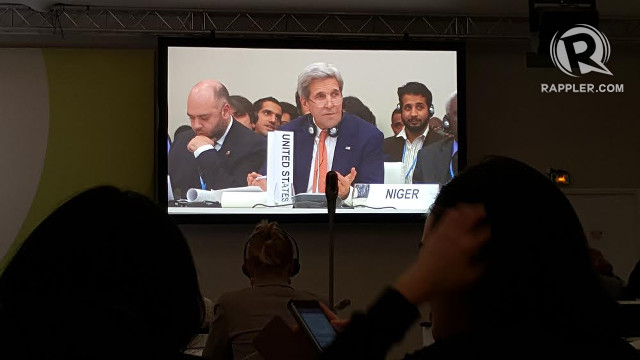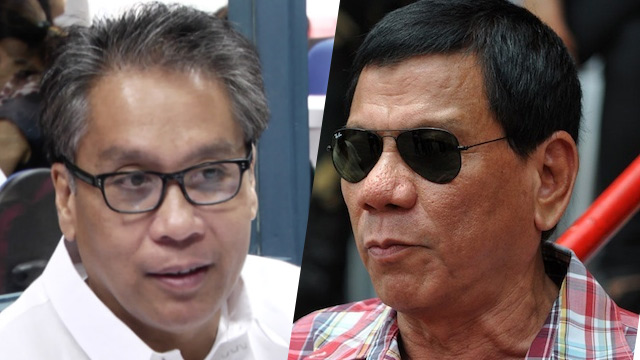![]()
As usual, the deadlock in the ongoing UN climate change summit here in Paris is being depicted by the media, government officials, NGOs, and even activists as a reprise of the long-running struggle between the so-called “developed” and “developing” countries and/or between “big polluters” and the “people.”
These narratives are not entirely wrong: For the past twenty years, developed and developing countries have indeed been tangling over who is more responsible for climate change and who should be obliged to cut more emissions and provide resources and technology to others. “Big polluters” and the “people,” i.e. environmentalist groups, NGOs, etc., have indeed been wrangling over whether and how fossil fuel companies should be regulated.
But they also obscure a bigger fight: the global struggle over whether and how to go about what activists have called “system-change.”
For rather than being divided simply between developed and developing countries, or between ‘big polluters’ and the ‘the people,’ even people from the same government, the same environmentalist organizations – sometimes even the same individual – have formed, and have been torn between, different camps or “blocs,” each pushing for different ways of “changing the system,” for different ways of organizing the world – and with them, for different ways of making sense of what the fight is all about.
Indeed, one of the most important stakes in this struggle is precisely how the broader public sees this struggle: whether they see it as a just a fight between developed and developing countries or between big polluters and the ‘people’ – or whether they see it as a fight between those who want to perpetuate capitalism and those who aspire for a new civilization altogether.
The radical system-change bloc
Typically rendered invisible in most standard accounts of the climate negotiations is the bloc which, in many ways, actually placed the issue of the global ecological crisis on the table and precipitated this global struggle: the bloc calling for “system change” in the sense of abolishing or transcending global capitalism.
Surprising many, this bloc first burst onto the world stage in the 1960s and 1970s as scientists, journalists, writers, organizers and other activists from the middle or lower classes put forward varieties of a different way by which people can make sense of and act upon their growing anxiety over “environmental” problems during this period.
Against other intellectuals from the dominant classes, they – and the many others who followed them – generally call upon the world’s masses as members of classes or subordinate groups and tell them they are suffering from ecological distress and deteriorating living conditions because they – and the ‘nature’ they are part of – are being exploited by the dominant capitalist classes and state officials. These elites are driven to do so, they argue, because they are forced to accumulate profits to survive market competition and find it difficult to regulate the market because private property relations impede efforts at rational planning.
In short, they tell the masses they are suffering because of the “system” or because capitalism and the other relations of domination it combines with.
To end their suffering, they tell them that simply regulating capitalism is necessary but it won’t be enough; they need to fight for nothing less than “system change” in the sense of abolishing capitalist property relations and replacing capitalism with another system.
They differ on how exactly that alternative system would work, but they all generally push for more democratic ownership and control over resources as at least a precondition for more fundamental transformations for class, gender, and racial relations.
Put differently, they tell the masses that the “concrete phantasy,” or the vision of the “good society” that they should aspire for, should be the creation of a greener, more equitable, because non- or post-capitalist society.
They differ on who to consider the “principal” or more dangerous adversaries, but they all commonly tell the masses to stop seeing the dominant classes—and all those who help them perpetuate capitalism—as their “friends” but as their “enemies,” the ones they should be fighting against if they are to end their suffering.
To develop their bloc’s ability to fight for this vision of “system-change,” members of this bloc have formed various organizations and coalitions at the national and global levels and built their capacity in public education and mobilization. Through all these efforts, they would be able to draw in more and more adherents through the years, mainly from subordinate classes but also even from the middle and upper classes.
Today at the UN summits, they could be found mainly “outside” the conference venue: co-organizing the alternative People’s Summits and seminars, joining the radical “System-change not climate change!” blocs during the big demonstrations, engaging in “direct actions” targeting not just the “bad capitalists” and the developed-country governments but also the so-called “good capitalists” and developing-country governments committed to perpetuating capitalism.
But they are arguably also “inside” the conference venue not just in the sense that they also participate in the negotiations as heads of governments or as members of the radical wing of the Climate Justice Now! network but in the sense that they—or the threat and alternatives they pose—are very much present in the minds of the other actors participating in the negotiations.
The reformist system-change bloc
Indeed, the second main camp in climate politics—a bloc calling for “system change” in the sense of enhancing the regulation of capitalism at the global level—largely emerged to counter the radical bloc.
Initially formed by relatively high-born or aristocratic state officials, business executives, experts, foundation officials and other notables – those Karl Polanyi would have called “enlightened reactionaries” – not just from the most advanced capitalist countries but also from developing countries, this bloc first emerged or was consolidated in the 70s and 80s to contain the global radical resurgence.
It came together as these forward-looking intellectuals drawn from or aligned with the dominant classes put forward a different way of diagnosing and solving global environmental problems to counter those being propagated by the radicals.
Against radicals, they – and those who have followed them – call upon the world’s masses to think of themselves primarily as “citizens” or “consumers,” or as members of subordinate groups – of “developing countries” or of “low income groups” – whose interests are ultimately compatible with those of the interests of the dominant groups.
They tell them they are suffering from ecological problems not because of capitalism per se but because of the weakness of the regulation of capitalism at the local and global levels. And they tell them they could only significantly improve their condition not by overthrowing capitalism but by fighting to improve it: that is, by appealing to the world’s states to “cooperate” in putting in place the “management of resources and the environment on a global scale.”
They have significant disagreements over how exactly to carry this out, but they all generally push for undertaking unprecedented internationally-coordinated government interventions in the global economy to drastically reduce global emissions and for establishing a kind of de facto global ‘welfare scheme’ to channel resources to poorer countries or communities.
Put differently, they tell the masses that their “concrete phantasy,” or the vision of the “good society” that they should aspire for, should not be the creation of a post-capitalist society but only of a greener, because more regulated, capitalist society.
They differ on who the primary foes are in achieving this vision, but they all generally urge the masses to view and fight as enemies only particular members of the dominant group, i.e. those “bad capitalists” or “bad elites who benefit from and oppose regulation (the “big polluters” or the “developed countries”) along with the radicals.
To improve their bloc’s ability to fight for this reformist vision of “system-change,” they have funded or otherwise whole battalion of academic centers, research departments and scientific networks that would generate specific ways of framing and understanding “global environmental problems” in such a way as to make them “manageable,” thereby turning the “global environment” into a new domain of knowledge and object of intervention. They have bankrolled the formation of hundreds if not thousands of other moderate environmental groups that would go on to play central roles in raising awareness on climate change and pushing for “climate action” at the national and global levels.
Indeed, it would not be an exaggeration to say that if it weren’t for the initiative and resources of these reformists—and if it weren’t for the elites that supported them, the UN negotiations on climate change might not even have commenced at all.
Through all their efforts, they would be able to draw in more and more adherents through the years, including modernizing elites from the Third World, as well as “public interest” lawyers, progressive-minded scientists, labor leaders and other activists through the years.
Today at the UN summits, they operate mainly “inside” the conference venue: as negotiators or experts for both developed and developing country-governments, or as lobbyists or activists from the Climate Action Network or the moderate wing of the Climate Justice Now! network.
But they have also increasingly gone “outside”: not just in the sense of helping co-organize the “People’s Summits” and holding seminars there, joining the reformist section during the big demonstrations, or engaging in direct actions targeting only the so-called “bad capitalists” and the “bad elites,” but also in the sense that they—and the alternatives they pose—have also come to ‘occupy’ the minds of actors not directly participating in the negotiations.
The ‘conservative’ system-change bloc
Though they have become more visible in recent years, the last main camp—the bloc calling for “system change” in the sense of de-regulating capitalism at the global level—actually historically only emerged or came to be consolidated as a reaction to the formation of both radical and reformist blocs.
In contrast to the reformist bloc, this bloc was formed by relatively lesser-born state officials, business executives from relatively smaller business, experts who were excluded from elite circles, and other relative “outsiders” among the ranks of the upper classes who came together to push back against the barrage of national and global environmental regulations or the the more fundamental changes that reformists and radicals respectively began pushing for in the 70s.
Like the reformists, they and those who followed them also call upon or told the masses to think of themselves primarily as “citizens” or “consumers,” or as members of subordinate groups whose interests are ultimately compatible with the interests of the dominant groups.
But unlike the reformists, they tell them that if they are suffering from ecological problems at all—something some of them have questioned, it is not because of too little but of too much regulation.
So against reformists, they tell the masses they could significantly improve their condition by fighting to de-regulate capitalism: that is, by appealing to the world’s states to “cooperate” in keeping their hands off the global market or to actively create the “enabling environment” to enable firms to practice “self-regulation.”
They too have significant disagreements over how exactly to carry this out, but they all resist internationally-coordinated government interventions in the global economy to drastically reduce global emissions and reject establishing a de facto global ‘welfare scheme’ to channel resources to poorer countries or communities.
Put differently, they tell the masses they should aspire not for the creation of a greener, because more regulated, capitalist society but a greener, because de-regulated capitalist society.
Hence, like reformists, they urge the masses to morally categorize only particular members of the dominant classes—those “bad capitalists” or those “bad elites”—along with the radicals as the “enemies”; but unlike the reformists, they tell them that these “bad capitalists” or “bad elites” are all those who are benefiting from and who support more regulation: the “intellectual plutocrats,” the “Big Environmentalists,” or developing-country governments using climate change to gain competitive advantage.
To improve their bloc’s ability to fight for this conservative vision of “system-change,” they too have funded a battalion of researchers on how best to harness the power of the “free market” to protect the environment. They too have bankrolled the formation of environmental groups that would go on to play central roles in opposing “climate action” at the national and global levels.
Through all their efforts, they would also be able to draw in more and more adherents through the years, including conservative elites from the Third World, as well as more conservative lawyers, scientists, labor leaders and other activists from across countries.
Today at the UN summits, they also operate mainly “inside” the conference venue: as negotiators or experts for some developed and developing country-governments or as lobbyists belonging to the so-called Business and Industry NGOs (BINGOs).
But they are also “outside”: not just in the sense of organizing the alternative business summits and corporate expos alongside the summits, or holding behind-the-scenes talks with government officials, but also in the sense that they—and the alternatives they pose—have come to influence broader publics.
A global struggle for hegemony
Much of what has happened over the last twenty years in the climate change negotiations could be better understood in terms of these competing blocs’ struggle to win people to their side and push for their visions of system-change.
After twenty years of trying, reformists have still largely failed to put in place the kind of stronger global environmental regulations they seek to stave off more radical alternatives because, as conservatives mobilized to oppose them, divisions in their own bloc deepened: Some reformists, mainly from the developed countries, would decide to appease conservatives by agreeing to lower emissions targets, give them more flexibility through carbon trading mechanisms, and tone down their demands for financial and technology transfers to developing countries.
Other reformists, mainly those coming from developing-country governments and “civil society,” would oppose these concessions but would be unable or unwilling to actually block “consensus” in the negotiations by threatening to withhold resources such as market access, labor, and other resources that could force conservatives and their reformist allies to reconsider.
Pushing for reforms and concessions but only partially able to deliver, reformists would consequently not be able to fully suppress the radical bloc altogether—but they would still manage to divide it: Driven to defend even just the limited reforms and concessions that reformists were offering, some radicals would decide to ally with reformists first, and rally the people to fight against the “bad elites” or the “bad capitalists” first (the “developed countries” or the “big polluters”) instead of fighting all of them altogether.
The result is that, while the radical bloc has survived elites’ efforts to destroy it, it too has failed to block the kind of system-preserving system-changes that the reformist and conservative blocs have been promoting.
Whether and how the world responds to climate change ultimately depends on which of these competing blocs prevail in this continuing struggle – a struggle which is ultimately a struggle to shape how the world’s peoples should understand what this fight is about, who they should be fighting against, and what they should be fighting for. – Rappler.com
Herbert Docena is a PhD candidate in Sociology at the University of California, Berkeley.
![]()
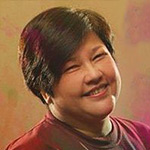




 Arvin* was 22-years old and counted knowing how to do massage and how to work a computer as his only two skills. He learned the science of kneading and stroking anatomical pressure points from working at a local massage parlor in his hometown.
Arvin* was 22-years old and counted knowing how to do massage and how to work a computer as his only two skills. He learned the science of kneading and stroking anatomical pressure points from working at a local massage parlor in his hometown.




 “P******** sino ang iboboto ko?” (Damn, who will I vote for?)
“P******** sino ang iboboto ko?” (Damn, who will I vote for?)
 “I have no doubt we shall win, but the road is long, and red with monstrous martyrdoms.” – Oscar Wilde
“I have no doubt we shall win, but the road is long, and red with monstrous martyrdoms.” – Oscar Wilde

 We are always in search of heroes, especially in these times of hardship when the rich are getting richer at the expense of the poor becoming poorer.
We are always in search of heroes, especially in these times of hardship when the rich are getting richer at the expense of the poor becoming poorer.







 How do we connect the miseries of the small and marginalized people in the climate vulnerable countries to huge profits of big companies in affluent countries?
How do we connect the miseries of the small and marginalized people in the climate vulnerable countries to huge profits of big companies in affluent countries?

